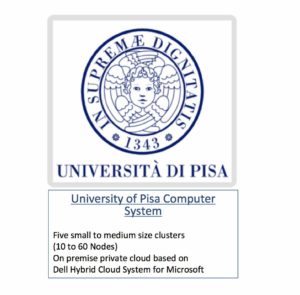This sponsored post from Intel shows how a pre-integrated, validated and supported HPC software stack allows the University of Pisa to focus on research.
 More than 200 researchers at the University of Pisa use high performance computing (HPC) systems in their quantum chemistry, nanophysics, genome sequencing, engineering simulations and areas such as big data analysis. Because these research teams use a variety of different applications that often have unique software dependencies, they create significant demands for the University of Pisa’s IT Center. Supporting this software portfolio requires extensive integration, configuration and testing. To help solve these challenges, the IT Center has moved to a pre-integrated HPC software stack designed to simplify software installation and maintenance.
More than 200 researchers at the University of Pisa use high performance computing (HPC) systems in their quantum chemistry, nanophysics, genome sequencing, engineering simulations and areas such as big data analysis. Because these research teams use a variety of different applications that often have unique software dependencies, they create significant demands for the University of Pisa’s IT Center. Supporting this software portfolio requires extensive integration, configuration and testing. To help solve these challenges, the IT Center has moved to a pre-integrated HPC software stack designed to simplify software installation and maintenance.
Overcoming the Complexity of HPC Software
An HPC system software stack consist of dozens of components, that administrators must integrate and validate before an organization’s HPC applications can run on top of the stack. Ensuring stable, reliable versions of all stack components is an enormous task due to the numerous interdependencies. This task is never-ending because of the rapid release cycles and updates of individual components.
[clickToTweet tweet=”University of Pisa’s IT Center has moved to a pre-integrated HPC software stack. #hpc” quote=”University of Pisa’s IT Center has moved to a pre-integrated HPC software stack. #hpc”]
University of Pisa’s Chief Technical Officer, Maurizio Davini states, “University of Pisa’s average HPC system software stack build, with Base OS pre-installed, and validation for our 32 Compute Node system may take up to one or two days.” This prevents the rapid turnaround needed to support a wide variety of research applications.
Combining the Benefits of Open Source and Commercial Software
To solve this problem, Davini and his team turned to the community-developed HPC system software stack from OpenHPC, a Linux* Foundation Collaborative Project. OpenHPC includes a comprehensive set of commonly required HPC components, such as provisioning tools, resource management, I/O clients, development tools, and a variety of scientific libraries. It also features a modular architecture, which allows administrators to add new components or modify existing ones without major disruption to the overall environment.
The University of Pisa has taken a further step toward making their Center more like a commercial service by taking advantage of the Intel distribution of OpenHPC.
The University of Pisa has taken a further step toward making their Center more like a commercial service by taking advantage of the Intel distribution of OpenHPC. To make the OpenHPC stack ready for deployment, Intel does pre-integration and integration testing across all components, and performs testing at scale (systems up to 1,000 nodes) on a variety of processor, memory, storage and fabric configurations. Intel distributes the validated stack under the name Intel HPC Orchestrator and includes technical support.

Intel HPC Orchestrator system software platform
Using the Intel HPC Orchestrator stack, Davini and the IT team are able to stand up a new application in a few hours instead of the days it previously took. The team uses Intel HPC Orchestrator for both bare metal and virtual deployment models so they can use the same software tools for their dedicated infrastructure or cloud-based cluster solution. The Intel HPC Orchestrator distribution also comes with a trial license for Intel software development tools including compilers, high performance libraries, performance tools and diagnostic tools.
Davini believes that this model, which is similar to open source Linux and its commercial distributions, is a good approach for HPC and can provide additional value to the University of Pisa in the future. Commercial support will make it easier for the University to take advantage of new software components and hardware innovations. In addition, commercial suppliers will integrate OpenHPC with application development tools such as compilers and libraries for FORTRAN, C, C++, Python, Java and .NET. This will help HPC developers leverage their existing skill sets to develop and port applications to HPC systems. Davini also hopes to see user groups grow up around HPC commercial distributions so HPC developers and administrators have more ways to share and sources of expertise they can fall back on when needed.
Read the University of Pisa case study, or learn more about Intel HP Orchestrator.




